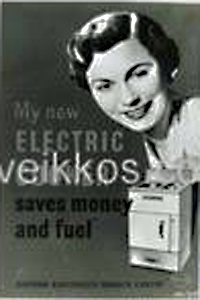
When Canada became a signatory to the Kyoto protocol, many Canadians held their heads a little higher thanks to an increased sense of moral virtue. After all, we just had to look to the ‘ignorant’ south, who didn’t sign Kyoto, to feel better about ourselves. It’s now a few years later and sadly little has changed in terms of our emissions, despite the Kyoto requirements. Certainly there’s a greater amount of media awareness surrounding the issue, and many Canadians have begun to think about the ramifications of climate change. Indeed, the exceptionally warm winter that we are all experiencing this year should prove that the times they are a changin’. In case you assume this to be a momentary blip in weather statistics, it should be noted that of the ten warmest years in recorded history, eight have occurred since 1990.
We all know that transportation is a big part of the problem, but electricity consumption is also a climate change issue. At it’s heart it all boils down to this: we are going to be using a lot of electricity for the foreseeable future. As more items become electrified and more people (ie: China, India, etc) can purchase and use them, electricity use will skyrocket over the coming decades. There’s just one problem: it can’t, at least with our current methods of production.

Most of North America’s electricity comes from burning coal and oil. This has two fairly severe consequences. Firstly, both are finite resources that will not sustain our current usage profiles let alone adapt to the ever-increasing population. Secondly, there’s that pesky business about air pollution, as emissions from generators are the biggest single contributors to climate change and smog.
It is likely that nuclear power will have to fill the deficit when oil use becomes more prohibitive. Don’t believe me? How about some math on this issue. 65% of North American electricity comes from oil, coal, and natural gas. These technologies will never be clean. Either we accept dirty air which warms our planet, or we reduce demand to 35% of our current usage. Given how much we all like our televisions and fridges, the latter seems unlikely. Renewable technologies cannot currently match this level of production. Once every building is fitted with solar panel roofs and wind generators are almost household items, maybe then we can start talking about sustainable growth. Until then, our growth will be always-already unsustainable. More than likely however, over the next few decades we will see the proliferation of nuclear generation, with all the environmental, social, and safety issues that it entails.
So what can be done by the average person? While not everyone has the money to dump $15,000 into a personal solar or wind generation system, there are many other steps that can be taken to ensure that your energy use is minimized. Of course, if you can afford to install a small wind generator or add solar panels to your property, then please do so. In fact, give me a ring and I’ll help you install your system. Check out Energy Alternatives for more details. If you are building a new house, why not add a renewable energy source? It will pay for itself in about a decade, and then your electricity will be free. Not a bad price, considering the increasing rates that power companies are charging.
One much smaller step that can be taken is to pay attention to those objects in your life that consume electricity. I know this sounds rather pedantic, but little things like changing all of the light fixtures in your house from incandescents to compact fluorescent will be a great step (and since these efficient bulbs last ten times longer than “normal” ones, you will be less of a burden on our landfills), Obviously, I am not suggesting that you ditch your high-tech gear and move into an earth-warmed cave in the woods. Electronic toys can be great fun, and definitely enhance many aspect of our lives. The easiest way to save on power use is to turn things off when you are done using them.

This may seem obvious, but you’d be surprised how many people leave appliances running when they are not in use. Televisions, stereo equipment, kitchen appliances – if they aren’t in use, turn the damn things off. Fans, heaters, lights, and such don’t really need to be on when you aren’t actually in the room. Here’s a fun idea: put all your lights and fans on motion sensors and timers so that they only operate when they are needed, then forget about them.
Computer equipment is another culprit. Monitors do not need to be on when the computer is not in use, and you can set up Windows to put the whole computer into a low power mode using the screensaver settings. Don’t leave the machine running overnight unless it’s actually performing a function. In this capacity I am looking straight at Hamilton’s business community. Just walk past a place of business at night and you can see that most of them leave their computers and cash registers on all the time. There’s no need for those monitors to be on all the time guys; turn ‘em off, save some cash. Even better, if you see that a business is wasting power, why not walk in and tell them? It’s usually out of ignorance rather than apathy that waste occurs. Also, when you go away on vacation, don’t leave on lights or appliances as a means to deter thieves. My cop buddies tell me that robbers tend to “case the joint” before doing anything. Most thieves are smart enough to notice things to suggest that you aren’t actually home, such as lights which never turn on or off, cars which never appear or leave the house, and people who don’t come and go. If you want to play this game with them, at least get a timer to control the lights. Otherwise, your little counter-insurgency strategy is entirely laughable.
Perhaps most importantly, if everyone were to upgrade their house to ensure maximum efficiency, a great deal of electricity would be saved. The federal government is actually providing grants for this very purpose. You do have to invest some money yourself to have an energy audit performed and retrofit your house to maximize efficiency. There is serious money available to those who truly wish to lower their household power use. Find out more at the website for the Office of Energy Efficiency.
Reducing our energy consumption isn’t a leftist agenda. In the long run, saving money is something from which we can all benefit. That our air will be more breathable and our climate more liveable is icing on the cake.
No comments:
Post a Comment